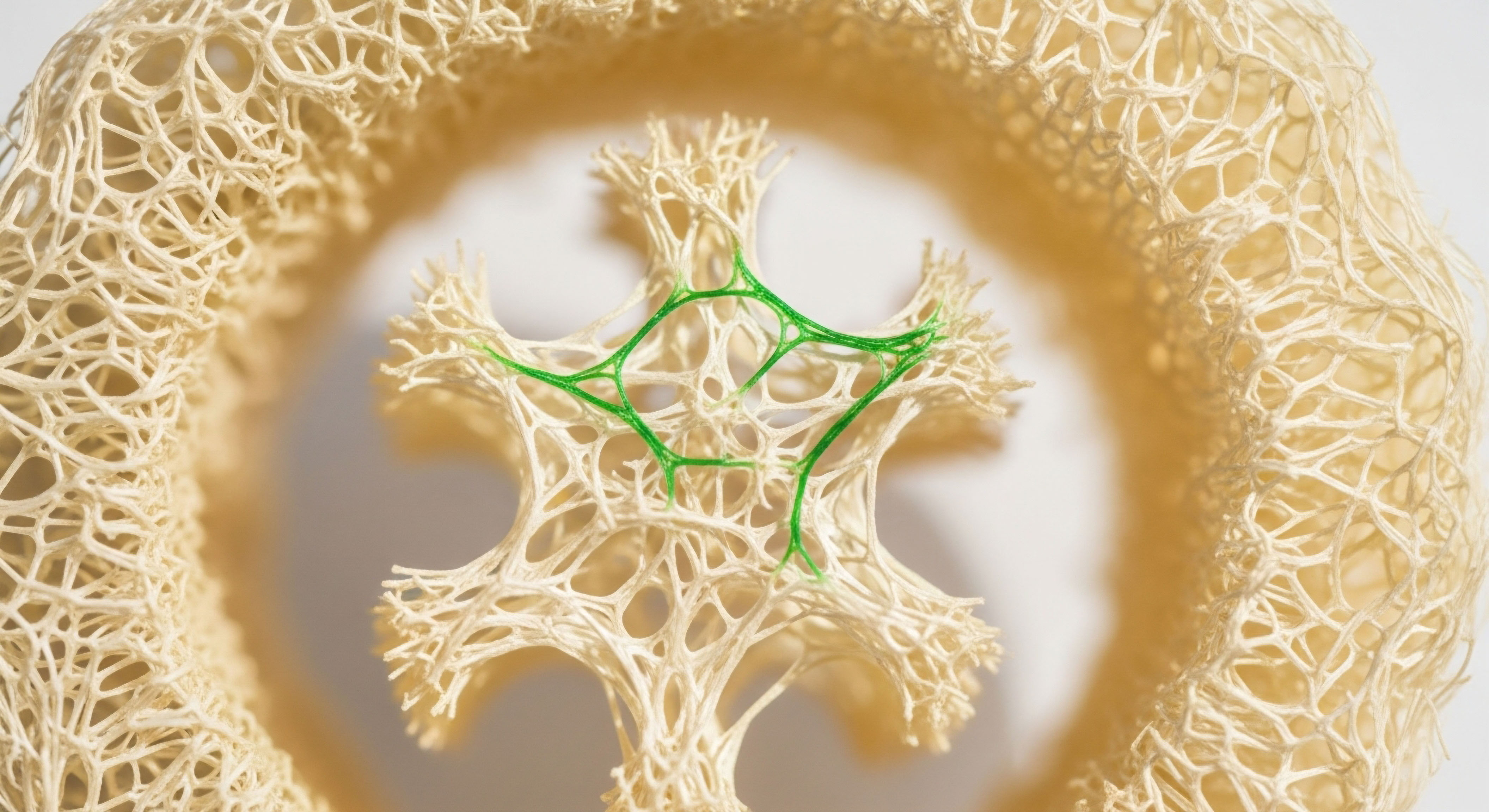

Fundamentals
Have you ever found yourself standing in a room, the purpose for entering it suddenly vanishing from your mind? Perhaps you struggle to recall a name that feels just beyond reach, or notice a persistent mental fog that clouds your clarity. These moments, often dismissed as simple signs of aging or daily stress, can feel disorienting and frustrating.
They are not merely fleeting inconveniences; they represent a subtle yet significant shift in your internal landscape, a whisper from your biological systems signaling an imbalance. Your experience is valid, and understanding the intricate interplay within your body offers a pathway to reclaiming sharp, focused cognitive function.
The human body operates as a symphony of interconnected systems, with hormones serving as the vital messengers orchestrating countless biological processes. These chemical communicators, produced by various glands, travel through the bloodstream to exert their influence on distant cells and tissues. When this delicate hormonal communication falters, the effects can ripple throughout the entire physiological network, impacting areas far beyond what might initially seem obvious. One such area, profoundly susceptible to these fluctuations, is the brain.
The endocrine system, a collection of glands that produce and secrete hormones, directly influences brain function. Hormones regulate everything from mood and energy levels to sleep cycles and, critically, cognitive abilities. A disruption in the precise balance of these powerful biochemicals can manifest as changes in memory, attention, processing speed, and overall mental acuity. Recognizing these connections marks the first step toward understanding your body’s signals and restoring its optimal performance.
Hormonal shifts can profoundly influence cognitive sharpness and mental processing.

The Brain’s Hormonal Environment
The brain, despite its protective barriers, is highly sensitive to hormonal signals. Specific regions, such as the hippocampus, crucial for memory formation, and the prefrontal cortex, responsible for executive functions, possess numerous receptors for various hormones. These receptors act as docking stations, allowing hormones to bind and initiate a cascade of cellular responses that modulate neuronal activity, synaptic plasticity, and even neurogenesis, the creation of new brain cells.
Consider the impact of sex steroids. For men, testosterone plays a role in maintaining cognitive vitality. Research indicates that physiological levels of testosterone influence neurobiological processes linked to cognitive aging and neurodegenerative conditions. It can delay neuronal apoptosis, accelerate nerve regeneration, modulate neuronal damage from oxidative stress, and exert anti-inflammatory actions. Lower endogenous testosterone levels in older men may correlate with poorer performance on certain cognitive assessments.
For women, estrogens and progesterone hold significant sway over brain health. Estrogen, particularly estradiol, supports cholinergic neuronal integrity, a system vital for memory and learning. Declining estrogen levels post-menopause are thought to influence the activity of many neurotransmitter systems, potentially increasing the risk of cognitive decline. Progesterone also contributes to cognitive function, with studies showing its association with changes in brain activation patterns during visual memory tasks.

How Do Hormonal Signals Reach the Brain?
Hormones reach the brain through the bloodstream, crossing the blood-brain barrier in specific regions or acting on areas where the barrier is more permeable, such as the hypothalamus. Once inside the brain, they interact with specific receptors on neurons and glial cells, the supporting cells of the brain. This interaction can directly alter neuronal excitability, neurotransmitter synthesis and release, and the expression of genes involved in brain cell maintenance and function.
The intricate feedback loops of the endocrine system ensure that hormone levels are tightly regulated. For instance, the hypothalamic-pituitary-gonadal (HPG) axis coordinates the production of sex hormones. The hypothalamus releases gonadotropin-releasing hormone (GnRH), which prompts the pituitary gland to secrete luteinizing hormone (LH) and follicle-stimulating hormone (FSH).
These, in turn, stimulate the gonads (testes in men, ovaries in women) to produce testosterone, estrogen, and progesterone. Disruptions at any point in this axis can lead to widespread hormonal imbalances that affect cognitive performance.
Understanding these foundational biological principles is the first step in addressing cognitive concerns. It shifts the perspective from isolated symptoms to a holistic view of the body’s interconnected systems, offering a more complete picture of your health.


Intermediate
When the subtle signs of cognitive change appear, a deeper investigation into the body’s biochemical communication becomes essential. Hormonal imbalances are not abstract concepts; they represent measurable deviations from optimal physiological ranges that can significantly impact daily mental performance. Addressing these imbalances often involves precise, clinically informed protocols designed to recalibrate the endocrine system, thereby supporting brain health and restoring cognitive vitality.
Targeted hormonal support can significantly improve cognitive clarity.

Targeted Hormonal Optimization Protocols
Personalized wellness protocols aim to restore hormonal equilibrium, recognizing that each individual’s biological system responds uniquely. These protocols often involve the judicious application of specific hormonal agents or peptides, guided by comprehensive laboratory assessments and a thorough understanding of an individual’s symptoms and goals. The objective is to bring hormone levels back into a range that supports not only physical well-being but also robust cognitive function.

Testosterone Replacement Therapy for Men
For men experiencing symptoms of declining testosterone, often termed andropause, testosterone replacement therapy (TRT) can be a transformative intervention. Symptoms such as diminished mental sharpness, reduced motivation, and changes in mood can often be linked to suboptimal testosterone levels. TRT aims to restore these levels, which can lead to improvements in various cognitive domains.
Studies indicate that testosterone supplementation may enhance spatial memory, spatial ability, and verbal memory in older men. While some research has shown mixed results, there is evidence that TRT can have beneficial effects on cognitive function, particularly in men with mild cognitive impairment or Alzheimer’s disease.
A standard protocol for male hormone optimization often involves weekly intramuscular injections of Testosterone Cypionate (200mg/ml). This approach provides a steady supply of the hormone, helping to stabilize levels and mitigate fluctuations. To maintain the body’s natural testosterone production and preserve fertility, Gonadorelin is frequently included, administered as subcutaneous injections twice weekly. Gonadorelin stimulates the pituitary gland to release LH and FSH, supporting testicular function.
Estrogen conversion from testosterone is a natural process, but excessive levels can lead to undesirable side effects. To manage this, Anastrozole, an aromatase inhibitor, is typically prescribed as an oral tablet twice weekly. This medication helps block the conversion of testosterone to estrogen, maintaining a healthy balance. In some cases, Enclomiphene may be added to further support LH and FSH levels, particularly when fertility preservation is a primary concern.

Testosterone Replacement Therapy for Women
Women, too, can experience cognitive shifts linked to hormonal changes, particularly during peri-menopause and post-menopause. Symptoms like irregular cycles, mood fluctuations, hot flashes, and reduced libido often accompany these transitions. Low-dose testosterone therapy, alongside other hormonal support, can address these concerns and support cognitive health. Research suggests that higher estradiol levels correlate positively with verbal memory and retrieval efficiency, while testosterone shows positive links to verbal fluency.
Protocols for women typically involve lower doses of testosterone compared to men. Testosterone Cypionate is often administered weekly via subcutaneous injection, usually in doses of 10 ∞ 20 units (0.1 ∞ 0.2ml). Progesterone is a vital component, prescribed based on menopausal status, to support uterine health and contribute to cognitive well-being.
Progesterone has been associated with improved neuropsychological measures of verbal working memory. For long-acting delivery, Pellet Therapy, involving subcutaneous testosterone pellets, may be an option, with Anastrozole considered when appropriate to manage estrogen levels.

Post-TRT or Fertility-Stimulating Protocols for Men
For men who have discontinued TRT or are actively trying to conceive, specific protocols are implemented to restore natural hormonal function and support fertility. This typically involves a combination of medications designed to stimulate endogenous hormone production. The protocol includes Gonadorelin, which stimulates LH and FSH release, alongside Tamoxifen and Clomid.
Tamoxifen and Clomid are selective estrogen receptor modulators (SERMs) that block estrogen’s negative feedback on the pituitary, thereby increasing LH and FSH secretion and stimulating testicular testosterone production. Anastrozole may be optionally included to manage estrogen levels during this phase.

Growth Hormone Peptide Therapy and Cognitive Support
Beyond traditional hormone replacement, targeted peptide therapies offer another avenue for supporting cognitive function and overall vitality. Growth hormone (GH) plays a significant role in brain health, influencing neurogenesis, neuronal survival, and synaptic plasticity. As GH levels naturally decline with age, supporting its production can have beneficial effects on cognition.
Key peptides used in this context include Sermorelin and Ipamorelin / CJC-1295. Sermorelin is a growth hormone-releasing hormone (GHRH) analog that stimulates the pituitary gland to produce and release its own GH. Ipamorelin, a growth hormone-releasing peptide (GHRP), also stimulates GH release, often used in combination with CJC-1295 to provide a more sustained elevation of GH levels.
These peptides have been shown to enhance sleep quality, improve mental clarity, and support neurogenesis, making them promising for mitigating age-related cognitive decline.
Other peptides like Tesamorelin and Hexarelin also act as GH secretagogues, contributing to improved body composition, which indirectly supports metabolic and brain health. MK-677, an oral GH secretagogue, works by mimicking ghrelin’s action to stimulate GH release. These agents can contribute to enhanced cognitive function by supporting the brain’s metabolic needs and cellular repair mechanisms.
Peptide therapies can stimulate the body’s own growth hormone, benefiting brain function.

Other Targeted Peptides for Holistic Wellness
The scope of peptide therapy extends to other areas that indirectly, yet significantly, influence cognitive well-being.
- PT-141 (Bremelanotide) ∞ This peptide primarily addresses sexual health, but its mechanism of action involves stimulating melanocortin receptors in the brain, particularly in the hypothalamus. By influencing central nervous system pathways, PT-141 can enhance sexual desire and arousal, which can contribute to overall mood and mental state, indirectly supporting cognitive engagement.
- Pentadeca Arginate (PDA) ∞ A synthetic peptide derived from BPC-157, PDA is gaining recognition for its potential in tissue repair, healing, and inflammation reduction. While direct cognitive effects are still under investigation, its ability to support neuroprotective pathways, aid nerve repair, and reduce oxidative stress in the brain suggests a role in maintaining neurological health. Improved systemic healing and reduced inflammation can create a more favorable environment for optimal brain function.
These protocols, when applied with precision and oversight, represent a sophisticated approach to optimizing physiological function. They acknowledge the complex interplay between hormones, peptides, and the brain, offering pathways to restore balance and enhance cognitive performance.

Comparing Hormone and Peptide Actions on Cognition
The mechanisms by which hormones and peptides influence cognitive function vary, yet they often converge on common pathways that support neuronal health and communication.
| Agent Type | Primary Cognitive Impact | Mechanism of Action |
|---|---|---|
| Testosterone | Memory, spatial ability, verbal fluency, mood | Neuroprotection, anti-inflammatory, modulates neuronal damage, influences neurotransmitter systems. |
| Estrogen | Verbal memory, retrieval efficiency, executive function | Supports cholinergic neuronal integrity, influences neurotransmitter activity, neuroprotective effects. |
| Progesterone | Verbal working memory, visual memory | Modulates brain activation patterns, influences GABA system, neuroprotective. |
| Growth Hormone Peptides (Sermorelin, Ipamorelin) | Mental clarity, memory, neurogenesis, sleep quality | Stimulate natural GH release, promote neurogenesis, protect neurons from damage, influence brain metabolism. |
| PT-141 | Indirect mood and cognitive engagement via sexual health | Activates melanocortin receptors in the brain, influencing dopamine release and sexual arousal pathways. |
| Pentadeca Arginate | Neuroprotection, reduced oxidative stress, systemic healing | Supports nerve repair, reduces inflammation, promotes tissue regeneration, indirectly supports brain health. |


Academic
The human brain, a marvel of biological engineering, relies on a precisely calibrated internal environment to sustain its complex operations. When considering how hormonal imbalances affect daily cognitive function, the discussion moves beyond simple cause-and-effect to a deep exploration of systems biology. This perspective reveals the intricate, bidirectional communication pathways that govern brain health, highlighting how disruptions in one endocrine axis can cascade through others, ultimately impacting neural networks and cognitive output.

The Hypothalamic-Pituitary-Gonadal Axis and Neurocognition
The hypothalamic-pituitary-gonadal (HPG) axis stands as a central regulatory system, extending its influence far beyond reproductive function to directly modulate cognitive processes. This axis, a hierarchical network involving the hypothalamus, pituitary gland, and gonads, secretes hormones that are potent neurosteroids, affecting brain development, maintenance, and function throughout life. Age-related endocrine dysfunction within this axis is increasingly linked to cognitive decline and an elevated risk of neurodegenerative conditions.
For instance, the decline in sex steroids, such as testosterone in men and estrogen in women, is a well-documented aspect of aging. This reduction is not merely a localized event; it triggers compensatory changes within the HPG axis, including increased levels of gonadotropins like luteinizing hormone (LH) and follicle-stimulating hormone (FSH).
Elevated peripheral LH levels, for example, have been correlated with decreased cognition in both healthy women and men, and higher LH and FSH levels are observed in some patients with Alzheimer’s disease. This suggests that the entire HPG axis, not just individual hormones, contributes to the cognitive landscape of an aging individual.
Testosterone’s neuroprotective actions extend to modulating neuronal damage caused by oxidative stress and exerting anti-inflammatory effects within the brain. It influences various neurotransmitter systems, including dopaminergic and cholinergic pathways, which are critical for attention, memory, and executive function. The conversion of testosterone to estradiol via aromatase also plays a role, as estradiol itself is a significant neurosteroid with its own cognitive benefits, particularly for verbal memory. This dual action underscores the complexity of androgenic influence on the brain.
Estrogen’s impact on cognitive function in women is particularly pronounced. Estradiol, the primary estrogen, supports synaptic plasticity, neuronal survival, and glucose metabolism in the brain. It interacts with estrogen receptors (ERα and ERβ) widely distributed in brain regions vital for cognition, such as the hippocampus and prefrontal cortex.
The decline in estradiol during perimenopause and postmenopause can lead to reduced cerebral blood flow, altered neurotransmitter sensitivity, and diminished neurotrophic support, contributing to symptoms like “brain fog” and memory lapses. Progesterone, often co-administered with estrogen in hormone therapy, also exerts direct effects on brain function, influencing GABAergic systems and potentially improving verbal working memory.

Metabolic Health and Cognitive Intersections
The endocrine system’s influence on cognition extends deeply into metabolic regulation. Hormones like insulin, leptin, and ghrelin, traditionally associated with energy balance and appetite, are now recognized as significant modulators of neural plasticity and cognitive function. Chronic metabolic dysfunction, often stemming from lifestyle factors such as poor diet and insufficient physical activity, can lead to conditions like insulin resistance and obesity, which are strongly linked to accelerated cognitive decline and an increased risk of neurodegenerative diseases.
Insulin, for example, is not merely a regulator of blood glucose; it acts as a neurotrophic factor in the brain, supporting synaptic function and neuronal survival. Insulin receptors are abundant in the hippocampus and cortex.
When insulin signaling in the brain becomes impaired, as seen in conditions like type 2 diabetes, it can lead to reduced glucose utilization by neurons, increased oxidative stress, and inflammation, all of which compromise cognitive performance. This creates a vicious cycle where metabolic dysregulation exacerbates neural vulnerability.
Leptin, a hormone produced by fat cells, signals satiety to the brain and plays a role in energy expenditure. It also influences synaptic plasticity and neurogenesis in the hippocampus. Leptin resistance, common in obesity, can disrupt these brain functions, contributing to cognitive deficits.
Conversely, ghrelin, a hunger-stimulating peptide, has been shown to have neurogenic effects on the hippocampus and its levels are associated with cognitive function. The delicate balance of these metabolic hormones is paramount for maintaining optimal brain metabolism and cognitive resilience.
Metabolic hormones like insulin and leptin directly influence brain plasticity and cognitive function.

The Role of Growth Hormone and Peptides in Neuroprotection
Growth hormone (GH) and its downstream mediator, insulin-like growth factor-1 (IGF-1), are critical for neural health and cognitive function. GH receptors are expressed in various brain regions, including those involved in memory and cognition. GH can cross the blood-brain barrier and stimulate local IGF-1 production within the central nervous system, promoting neuroprotection and cell survival.
Age-related decline in GH secretion, often termed somatopause, has been associated with impaired cognitive function and brain activity. Growth hormone-releasing peptides (GHRPs) like Sermorelin and Ipamorelin work by stimulating the pituitary gland to naturally secrete GH, thereby bypassing the need for exogenous GH administration.
These peptides can increase IGF-1 mRNA levels in the hypothalamus, cerebellum, and hippocampus, regions vital for cognitive processing. This activation of the brain’s IGF system contributes to enhanced neurogenesis, improved synaptic density, and reduced neuronal cell loss, particularly after neurological insults like stroke.
The neuroprotective effects of peptides extend to agents like Pentadeca Arginate (PDA). While still an emerging area of research, PDA, a modified version of BPC-157, has shown promise in supporting nerve healing and providing protection against neurodegenerative conditions.
Its anti-inflammatory properties and ability to reduce oxidative stress are particularly relevant for brain health, as chronic inflammation and oxidative damage are significant contributors to cognitive decline. The systemic healing and regenerative capabilities of PDA can create a more resilient physiological environment, indirectly supporting optimal brain function.

Interconnectedness of Endocrine Axes and Cognitive Outcomes
The impact of hormonal imbalances on cognition is rarely isolated to a single hormone or axis. Instead, it represents a complex interplay where dysregulation in one system can perturb others. For example, chronic stress, mediated by the hypothalamic-pituitary-adrenal (HPA) axis and its primary hormone, cortisol, can significantly affect the HPG axis and metabolic function.
Elevated cortisol levels can suppress gonadal hormone production and induce insulin resistance, creating a multifaceted challenge to cognitive health. The hippocampus, highly vulnerable to chronic stress, is a key area where these interactions converge, leading to impaired spatial and declarative memories.
This systems-biology perspective emphasizes that restoring cognitive vitality requires a comprehensive approach that considers the entire hormonal and metabolic landscape. Interventions that address one imbalance often have ripple effects across other systems, contributing to a more holistic restoration of function.
| Hormonal Axis | Primary Hormones | Cognitive Impact | Interconnections |
|---|---|---|---|
| Hypothalamic-Pituitary-Gonadal (HPG) | Testosterone, Estrogen, Progesterone, LH, FSH | Memory, attention, executive function, mood regulation. Dysregulation linked to neurodegenerative risk. | Interacts with HPA axis (stress), metabolic hormones (insulin sensitivity). |
| Metabolic Hormones | Insulin, Leptin, Ghrelin, Thyroid Hormones | Brain metabolism, synaptic plasticity, neurogenesis, memory, attention, executive function. | Influenced by HPA axis (cortisol), sex steroids. Metabolic dysfunction exacerbates cognitive decline. |
| Growth Hormone (GH) Axis | Growth Hormone, IGF-1, GHRPs | Neuroprotection, neurogenesis, synaptic function, memory, mental clarity. | Influenced by HPG axis (sex steroids can modulate GH), metabolic status. |
The pursuit of optimal cognitive function is a deeply personal journey, one that requires a nuanced understanding of the body’s intricate biochemical machinery. By appreciating the profound connections between hormonal balance, metabolic health, and neural function, individuals can make informed choices that support their brain’s resilience and capacity for sustained clarity.

References
- Beauchet, O. et al. “Testosterone and cognitive function ∞ current clinical evidence of a relationship.” European Journal of Endocrinology, vol. 155, no. 5, 2006, pp. 773-781.
- Cherrier, M. M. et al. “Testosterone supplementation improves spatial and verbal memory in healthy older men.” Neurology, vol. 60, no. 10, 2003, pp. 1749-1754.
- Hogervorst, E. et al. “Testosterone supplementation and cognitive functioning in men ∞ A systematic review and meta-analysis.” Oxford Academic, 6 June 2019.
- Blair, J. A. et al. “Hypothalamic ∞ Pituitary ∞ Gonadal Axis Involvement in Learning and Memory and Alzheimer’s Disease ∞ More than “Just” Estrogen.” Frontiers in Aging Neuroscience, vol. 7, 25 Mar. 2015.
- Soares, C. N. “The Hypothalamic-Pituitary-Gonadal Axis and Women’s Mental Health ∞ PCOS, Premenstrual Dysphoric Disorder, and Perimenopause.” Psychiatric Times, 13 Oct. 2017.
- Hsu, B. et al. “Low Serum Testosterone Concentrations Are Associated With Poor Cognitive Performance in Older Men but Not Women.” Frontiers in Endocrinology, vol. 12, 31 Oct. 2021.
- Berent-Spillson, S. et al. “Distinct cognitive effects of estrogen and progesterone in menopausal women.” Psychoneuroendocrinology, vol. 59, 2015, pp. 104-113.
- Dumas, J. A. et al. “Effect of estradiol with or without micronized progesterone on cholinergic-related cognitive performance in postmenopausal women.” Frontiers in Aging Neuroscience, vol. 17, 5 May 2023.
- Riederer, P. et al. “Growth Hormone (GH) and GH-Releasing Peptide-6 Increase Brain Insulin-Like Growth Factor-I Expression and Activate Intracellular Signaling Pathways Involved in Neuroprotection.” Oxford Academic, 1 Jan. 2002.
- Blackmore, D. G. et al. “The multiple roles of GH in neural ageing and injury.” Frontiers in Endocrinology, vol. 14, 6 Mar. 2023.
- Saksida, L. M. et al. “Metabolic hormones mediate cognition.” Frontiers in Neuroscience, vol. 16, 8 June 2022.
- Wang, X. et al. “The therapeutic potential of metabolic hormones in the treatment of age-related cognitive decline and Alzheimer’s disease.” Frontiers in Aging Neuroscience, vol. 7, 25 Mar. 2015.
- Carolina Hormone and Health Center. “Sermorelin/Ipamorelin General Info Sheet.”
- Holistic Medical Wellness. “Pentadeca Arginate vs BPC-157 ∞ Benefits and Differences.”
- Medical Anti-Aging. “Pentadeca Arginate and BPC-157.”

Reflection
The journey to understanding how hormonal imbalances affect daily cognitive function is deeply personal, a path of self-discovery and empowerment. The insights shared here are not simply clinical facts; they are guideposts for navigating your own biological terrain. Recognizing the profound influence of your endocrine system on your mental clarity is the first step toward reclaiming a vibrant, fully engaged life.

Your Personal Health Blueprint
Each individual possesses a unique biological blueprint, and the path to optimal wellness is rarely a one-size-fits-all solution. The information presented about hormonal optimization and peptide therapies serves as a foundation, inviting you to consider how these principles might apply to your own circumstances. It prompts a deeper conversation with healthcare professionals who specialize in personalized wellness protocols, allowing for a tailored approach that respects your individual needs and responses.
Consider this knowledge a catalyst for introspection. What signals is your body sending? How might subtle shifts in your hormonal landscape be influencing your daily mental experience? This inquiry is not about seeking quick fixes, but about embarking on a sustained commitment to understanding and supporting your body’s innate capacity for balance and vitality.

A Continuous Process of Discovery
The science of hormonal health and cognitive function is continuously evolving, offering new avenues for understanding and intervention. Staying informed and engaging with evidence-based practices is a continuous process of discovery. Your proactive engagement with your health, armed with this deeper understanding, positions you as an active participant in your well-being, rather than a passive recipient of symptoms.
Ultimately, the goal is to equip you with the knowledge to make informed decisions, to advocate for your health, and to work collaboratively with clinical experts. This collaboration can help you unlock your full cognitive potential, allowing you to live with greater clarity, focus, and mental resilience.



